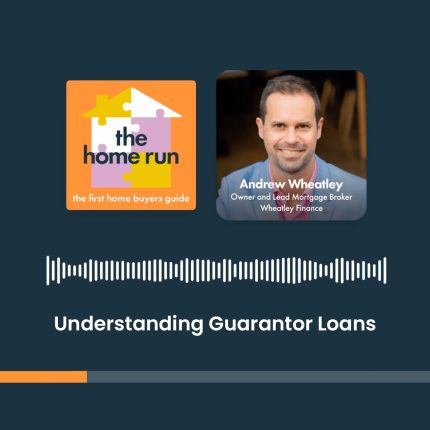Episode Outline
Show notes
Andrew Wheatley is the Owner and Lead Mortgage Broker of Wheatley Finance. With over 20 years of industry experience, Andrew has helped countless clients demystify their mortgages. He was also awarded the FBAA Victoria Broker of the Year Award, in both 2021 and 2022.
In this episode, Andrew explains all things guarantor loans, including what it is, and how it works. He also debunks some of the common misconceptions about guarantor loans, and shares who you can have as a guarantor, before breaking down how a guarantor loan might help lower the amount of deposit you need to buy your first home.
Get in touch with Andrew Wheatley
Owner Wheatley Finance
Website: www.wheatleyfinance.com
Email: andrew@wheatleyfinance.com
Phone: 0416 867 685
Transcript
Michael Nasser 0:00
The information contained in this podcast is general in nature and is not to be taken as financial or personal advice. It does not consider your objectives, financial situation or needs, you should consider whether this information is suitable for you and your personal circumstances before acting on it. Hi, and welcome to the home run your guide to buying your first home in Australia. On the show, I’ll walk you through the home buying process from every angle. We cover the steps to take the pitfalls to avoid, and the answers to all your questions you’ve been dying to ask. No matter what stage you’re at, you’ll learn everything you need to know about buying your first home. I’m your host Michael Nasser, and I’m a mortgage broker at Lendstreet and I really love helping people buy their first home. Today I’m speaking with Andrew Wheatley. Andrew is the owner and lead mortgage broker at Wheatley Finance. Andrew was awarded the FBAA Victoria Finance Broker of the Year Award in both 2021 and 2022. Now, we’ve all heard of guarantor loans, but do you really know how they work? In today’s episode, Andrew and I will break down what a guarantor loan is, and how it actually works. We’ll also debunk some of the misconceptions around what type of loans is, break down who can actually be a guarantor. And we’ll explain how a guarantor loan might help you lower the amount of deposit you’ll need to buy your first home. Let’s dive in. Andrew, hello, and welcome to the show. Thank you for joining us today.
Andrew Wheatley 1:31
Thanks for having me here, Michael.
Michael Nasser 1:33
We’d like to get started by getting to know you a little bit better. So if you could start off by telling us a bit about your professional background. How did you get to where you are today?
Andrew Wheatley 1:40
I think like most people in finance, I fell into it. I don’t think there’s too many kids at school at the moment who dream about working for a bank. At some point, I needed a job. And I’ve happened to be in a bank and I sort of fell in love with the work. And sort of 25 years later, I’m still in the industry. And I’m really glad that I fell into it.
Michael Nasser 1:58
Today we’re talking about guarantor loans. So it’s a topic that I know I get questioned about quite a bit, and I’m sure you do as well, you’ve got a bit of a specialty in this sort of space, I think we’re going to be able to provide some valuable insights for the listeners today on guarantor loans. And to start with let’s not talk about the benefits or the disadvantages of it, because we can talk about that next. But let’s first focus on what they are. So really basic tripping all the way back to what is a guarantor loan.
Andrew Wheatley 2:24
It’s a product that banks have, that allows you to buy a property without putting in any cash deposit, you could even borrow the full amount and the stamp duty. So literally no cash down and get into a property. The reason the bank would lend you the full amount, they would take a guarantee against someone else’s property. So they’re not just blindly lending more than a property’s worth, they’re getting a bit of a second property. And that’s what gives them the comfort to lend the full amount even though no cash has gone down.
Michael Nasser 2:54
So Andrew, when it comes to how a guarantor’s property can be used in lieu of a deposit, I guess, in lieu of probably a lack of a bit of term. But how does it work? Where we can basically have a have a scenario where the bank doesn’t need the deposit of you know, of a property?
Andrew Wheatley 3:11
Yeah, because on the surface, it sounds weird, doesn’t it? Why would the bank lend the full price of a property or even the full price plus the stamp duty? People think that you have to put down a cash deposit on a property? Because that’s just what most of us did. And that’s what our parents do. Banks don’t actually care whether you put cash down, what they’re looking at is how much do we have to call on if needed? And what percentage of that are we handing over as a loan? So the bank is gonna lend you 600,000, what they were doing a guarantor situation, they would put a charge against the guarantor’s property. So now what the bank has is a $600,000 property plus $150,000 against the guarantor’s property, they have $750,000 worth of property that they can call on if the loan is not being paid. And they’ve lent 600,000.
Michael Nasser 4:04
Understood, so they’ve got the asset of someone else, which is basically strengthened the whole deal, and that’s why they’re willing to consider funding the full purchase price, or more or less. So in that case, if people are using guarantor loan to reduce the amount of the deposit that they need, technically, they’re going to be borrowing more, can that have an impact on repayments that needs to be met.
Andrew Wheatley 4:22
Repayments are based off the amount that you borrow. That’s the trade off a guarantor loan, if you use it will allow you to buy sooner either no cash or less cash, because sometimes you might have some deposit. The trade off is you will have a larger debt.
Michael Nasser 4:37
And that obviously in turn then increases the repayments when it comes to the deposit side. Have you ever seen a situation where people have saved maybe a certain amount of deposit but not the full 20% that could make use of I guess a policy like this?
Andrew Wheatley 4:51
Yeah, absolutely. Particularly for first time buyers find a deposit strategy that’s going to let you buy the soonest with the least amount of fees and with the least amount of your cash going in. Now, the guarantor actually happens to tick all of those boxes, it’s opening up options that you could maybe either get a better property than you could have afforded otherwise, it also gives you the option of, again, let’s say you had a five or a 10% deposit, you could purchase now, parents are able to help out and be a guarantor, then you can avoid the mortgage insurance.
Michael Nasser 5:24
Have you come across a scenario where an applicant’s had maybe part of a deposit, but then it’s decided to go guarantor loan option? And what did that look like?
Andrew Wheatley 5:33
Yeah, I’ve seen it lots of times, I guess a really good example would be some clients of mine, Christie and Emily who, and at that point, they had a 5% deposit. They could have purchased, they’re in a position to, but the mortgage insurance costs were going to be $28,000 that was going to get onto their loan, all their money was going to go into that and they had a young child as well. But you know, if that takes to get in your first property, they were prepared to do it. But we did discuss the option of a guarantor loan, they went away and talked to both sets of parents and actually they were both keen to be guarantor, but we picked out one of them to be the guarantor, they ended up purchasing in about March 2020. We’re able to like keep hold of their their cash deposit. We just did the review on it now two years later. And at this point, now we’re able to remove the parents as guarantor.
Michael Nasser 6:18
That’s a massive benefit that they’ve been able to incur because of that particular type of policy. The caveat to that is, obviously, they’ve been able to borrow the full purchase price. So we’ve spoken a lot about the impact on the first homebuyer, what about the person who’s going guarantor, who can actually be a guarantor and a guarantor loan.
Andrew Wheatley 6:36
So there’s two main criteria for being a guarantor. Usually, their parents of the people who are borrowing the money, they don’t have to be parents, they can be a close relative. The second is that there’s enough equity in the property, so that there’s room to put that guarantee in some banks will also want to see that the guarantor has enough that if the guarantee got called on, that, they’d be able to borrow the money and not have to sell the property.
Michael Nasser 7:03
So instead, summarize those three things. So it’s been the appearance pretty much can be other people that that have a close family connection, but you know, 9.9 times out of 10, it’s going to be a parent, there’s got to be some equity in their property. And the third thing that you mentioned that that’s potentially a requirement is someone that has the income to service what the guarantor portion would be of that loan. But again, a broker will be able to sort of guide you through that process, too. So usually, what you see is parents going as guarantors for their kids. What about the house that’s being used as to guarantee can it be any house? Or are there requirements that need to be met in that regard?
Andrew Wheatley 7:35
Any property that’s acceptable to the bank. Now banks would prefer it be an investment property. No bank wants to be on a current affair with old lady having to sell her home because she went guarantor for her kids. Banks are very, very careful of the parents and the guarantors most your listeners are probably too young to remember. But there were issues around guarantors back in the 80s and 90s, where you had like old people signing off on stuff they didn’t even understand because they kids, were just saying, sign this for me, so I can buy a house. It wasn’t good.
Michael Nasser 8:05
And I think that’s a really critical point there. Because I know when I speak to clients, and when I’m speaking about buying their first home, and they speak about guarantor loans, one of the hardest things is, well, what happens if something goes wrong? It’s always that fear of, of what happens in that event? Obviously, there’s a lot of due diligence system before that to make sure you know, we don’t get to that point. So if a first home buyer defaults on the loan, does the bank come and repossess mum and dad’s house? And what does that process look like?
Andrew Wheatley 8:31
If they can’t get their money any other way, that’s exactly what would happen. There’s a lot of steps that would come before that. So it is pretty unlikely. I always say to people, when their parents are going guarantor, the first one is like, you should be grateful, give them a nice Christmas present this year, like they have really set you up. And the great thing from a parent’s point of view is that we’d all love to just hand our kids over a deposit, but you just might not have that cash lying around. This basically, lets parents give you a deposit. But without having to give you any cash, which, which is so great, because not everyone has that sort of cash lying around. The first thing that has to happen for this to come back on the parents is that you can’t make the mortgage repayment right now, what’s likely to lead to you not being able to make the mortgage repayments, people might say I lose my job. Look, I’m not here. I’m not an insurance agent. You don’t have to. But I think your parents have been cool enough to put their property up. Go take out some good income protection insurance. I think that’s the fair thing to do. Personal choice that I would say so. But the first thing it would have to happen is you can’t make the mortgage repayments right then the property would have self and not enough to pay back the mortgage, like maybe the banks out for like 50,000 or something. So that’d be one and make arrangement, right? So there is a whole there’s a lot of stuff that has to happen to get to that point. And that’s the worst case scenario.
Michael Nasser 9:50
I’ve been a mortgage broker since 2015. So not not as long as you yourself, but I know I’ve never seen an instance where it has happened, nor have I heard of an instance where it’s happened. I’m not sure if the same applies to yourself. But for me, it’s it hasn’t occurred. So it’s almost been a non event.
Andrew Wheatley 10:03
Look, I’m the same. And I, I, I tried to stop myself from being blase about it to the to the parents. You know, I’ve tried to make that extra effort to, I guess, say the bit, you don’t want to say, which is look, this potentially this could happen. So parents have the option. Right. I’m prepared to take that risk. I’m going to back my kids in here.
Michael Nasser 10:24
But I think your point on insurance was, I think was a great one, I think so that income protection insurance, and definitely reviewing that it’s a great time to do it at that particular point as well. Not one sentence to say thank you to mom and dad. But it’s just to ensure that there’s extra contingency plan in the event something does happen. So I think definitely reviewing your insurance options and speaking to the to the to the right person at that stage to make sure that you are properly and adequately covered if something does occur. I think that’s that’s a massive point.
Andrew Wheatley 10:52
Yeah, look, no one loses their house because house prices drop, you lose your house, because you can’t make the repayments.
Michael Nasser 10:57
And before we get into our final topic, do you have any recent success stories that you can share with us where you’ve helped the first home buyer with a guarantor loan getting to their property sooner?
Andrew Wheatley 11:05
Yeah, it did happen recently, that we truly wasn’t a first time buyer. So I had a couple recently, like Peter and Lucy, where he’d owned property before in a previous relationship, like there’s some really good first time buyer schemes around at the moment as well. But they just didn’t qualify for any of that. They earn good income, but they didn’t have a lot of deposit, paid, his parents were in a position to be guarantor, we’ll call it being guarantor. And now we’re able to step right in and buy a property only nothing this story, they’d got in touch with me, because we think we want to buy something a year or two, we just want to have a chat to kind of get to do they, they bought a property three weeks later.
Michael Nasser 11:42
So yeah, so I guess that they were able to give them a lot quicker than they probably initially anticipated, which is great. And, and they didn’t come up with a deposit. So they’re the things that we’ve been speaking about. Alright, some final thoughts, we always close off our interviews with two questions. First one is what’s your number one tip for first home buyers trying to enter the market?
Andrew Wheatley 12:02
Well, I think I said earlier, I’m very focused on deposit. So the amount you can borrow, there’s not too much you can do about it, there’s a little variation between banks, you can close out a credit card and stuff, what I find with most first time buyers, what limits them is the deposit, I would say that again, think about what deposit strategies, which will let you purchase the soonest, with the least amount of fees. And with the least amount of your cash going in. That is what you want to focus in on once you’ve got that right, everything else should fall in place.
Michael Nasser 12:32
And the second one is if you were a first home buyer, and you had a million dollars to buy, where would you buy?
Andrew Wheatley 12:38
My experience, the quicker you can get into the property, your family home for 10 or 15 years, that lays down a foundation for everything else that has to come. That might not possible, you might have to take a couple of steps around at first. But if for example, you could buy the place for eight or 900,000 or a million, that would have be the property that’s going to be you covered for next 10 years. So I would say don’t be afraid to try to get as close to the right property as you can.
Michael Nasser 13:09
I think it’s a great mentality too I mean, we’re not that I guess what we’re not doing is focusing on the price as much. It’s more about looking at what you’re looking to buy. And do you see yourself living there for 10 years. And I think if you can answer that question, yes. And you can get to that point where you can then you’re a lot better served than chopping and changing in 2, 3, 4 years, but you’ve got to pay more expense, more fees and more stamp duty and, and selling costs and all that type of stuff. So I think that’s a great way to approach that particular question. Well, thanks for joining us today. We really appreciate your time. Where can our listeners find you if they want to get in touch?
Andrew Wheatley 13:40
Your best place to go would be my website. www.wheatleyfinance.com. As you can see, I was pretty creative, trying to name my business, Michael, literally when I started up, I rang a friend of mine and said I’m trying to think of a good business names. Yes. Wheatley Finance. Okay.
Michael Nasser 13:58
That works. It’s nice. It’s a simple strategy, but it’s an effective strategy. So I think I think I think that’s a great one. But then, and we’ll have those details in our show notes as well. With with links on how you guys can get in touch with Andrew, if you guys want to. So thank you again for your time and we’ll catch up soon. Thank you.
Andrew Wheatley 14:16
Hey, thanks. I really enjoyed that cheers mate.
Michael Nasser 14:20
you’ve been listening to the home run your guide for buying your first home in Australia. This podcast was produced by Lendstreet. Lendstreet is a mortgage broker and home loan specialist that helps first-home buyers find the right loan to meet their needs. We know applying for a loan can be overwhelming and complex. So we help guide and support first homebuyers through the process from start to finish. To find out more, head to our website, Lendstreet.com.au. We’ve also put a link in the show notes. To make sure you don’t miss an episode of the home run. Be sure to subscribe to or follow the show in your podcast app. And while you’re there, please leave us a five-star review. It really helps others find the show. I’m Michael Nasser, and we’ll be back Our next episode covering another step on the journey to owning your first home




